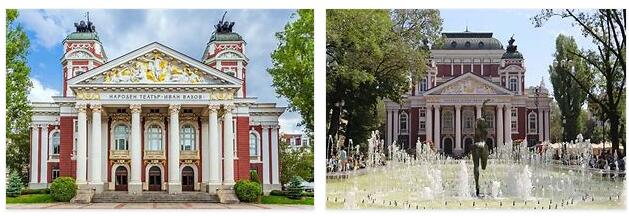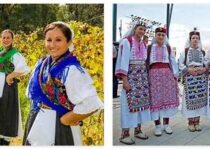Bulgaria Cinema and Theater
CINEMA
The pioneer was Vasil Gendov, an amateur who in 1910 filmed and played The Gallant Bulgarian. For decades the production remained temporary and sporadic, in a country without equipment, with the few cinemas powered by foreign films; yet Gendov continued until the 1930s, even getting censored The revolt of the slaves (1933), the first sound film. The “prehistory” lasted until 1950, when the nationalized cinema (in 1947) and equipped with the first series of structures produced Kalin l’Aquila. The films, few and uniform, were generally historical. Among the directors emerged Zahari Žandov (Allarme, 1951; Heroes of September, 1955), Borislav Šaraliev with a biography of the poet-martyr Vapcarov, Dako Dakovski who preferred the topicality of the countryside. In 1956 the political thaw marked a turning point also for Bulgaria and favored more lively and authentic works. Paired with screenwriter Valeri Petrov, director Rangel Valčanov shot a fascinating triptych: On the small island (1958), First lesson (1960), The sun and the shadow (1962). It dates back to 1961 We were young of Binka Želiazkova. The fine hatching of individual psychologies began to join the historical-political contents. In this decade the number of cinemas doubled, a cine-center equipped for films of all kinds came into full operation, documentary cinema (in which Christo Kovačev was mentioned) and animation (which had as its lead partner Todor Dinov); the production of feature films reached and exceeded the average of 15 per year. Among them we must remember at least: Tobacco (1962) by Nikolai Korabov, The peach thief (1964) by Veulo Radev, The horseman without armor (1966) by Sharaliev, Birds and greyhounds by Georgi Stoianov and The white room by Metodi Andonov, both from 1969. But perhaps the two most mature works were Deviation (1967) by Griša Ostrovski and Todor Stoianov, in terms of content, and Iconostasi (1968) by Todor Dinov and Christo Christov, which revolutionized Bulgarian cinema under the the formal aspect. Starting from the 1970s, the often minute description of everyday life, the comparison between generations, the problems of the individual became the favorite themes of the most sensitive Bulgarian filmmakers: Christov with The Last Summer and The Barrier, Želiazkova with The Pool and The large midnight bath, Djulgerov with The advantage (awarded at the Berlin Film Festival in 1978). Animated cinema and the historical vein also developed widely. The first thanks to Andronov (The goat’s horn set at the time of Turkish rule), to Ostrovski who in Gerlovo’s Story warns against the persistence of the fascist seed, and again, to the two leaders Christov (Anvil and hammer) and Želiazkova (The last words, on the liberation struggle). In the next generation, the names of Ludmir Kirchov (Illusion), Kirun Kolarov (Function: attendant, The Flying Man), Evgeni Michailov (The house of tender souls) stand out, 1981), to whose works are added the bitter provincial painting Hotel Centrale (1983), by V. Branev, and the pungent ballad Il fiume d’oro (1983), by I. Grabčeva, whose “heroes” are the country idlers. According to Relationshipsplus, the evolution of Bulgarian cinema, however, was interrupted by the geopolitical changes that involved all of Eastern Europe (1989-91) and by the considerable socio-economic problems that the country had to face. The film industry has been severely downsized, partly because it is no longer financially supported by the state, partly because it has been hit by the abandonment of the public, seduced by US productions not previously marketed in the country, and forced home by a serious economic crisis. In recent years, however, the situation has changed, so much so that we can talk about a new springtime for Bulgarian cinema: Zornitsa Sofija’s touching feature film (b.1979) Mila da Marte was the forerunner. (2005), the story of a teenager, Mila, who leaves the world of the city to find herself in a remote country village.
THEATER
The political power of the Ottoman Empire and the cultural power of the Orthodox Church prevented the birth of a Bulgarian theater for centuries. Only in 1865 was a theater company founded (but in Braila, Romania) to present works that dealt with the themes of national independence and a cultural renaissance. In 1888 companies were also formed in Sofia, which led in 1907 to the establishment of a National Theater directed by the dramatic critic Pavel Slavejkov. Meanwhile, a Bulgarian dramatic literature was born, but the theatrical activity was often hindered by external events, such as the fire of the National Theater in 1923 (it was reconstituted six years later) and the persecutions of which they were victims, in the years of the dictatorship of King Boris., innovative and politically engaged actors. After the war, the newly formed People’s Republic favored the development of the theater by founding a higher institute for the theatrical arts and multiplying the stable production organizations in the capital and in the provincial cities. The repertoire, after the years of Stalinist conformism, has been partly renewed since the 1960s, thanks above all to innovative directors, such as G. Ostrovski, M. Andonov and M. Kisselov.



